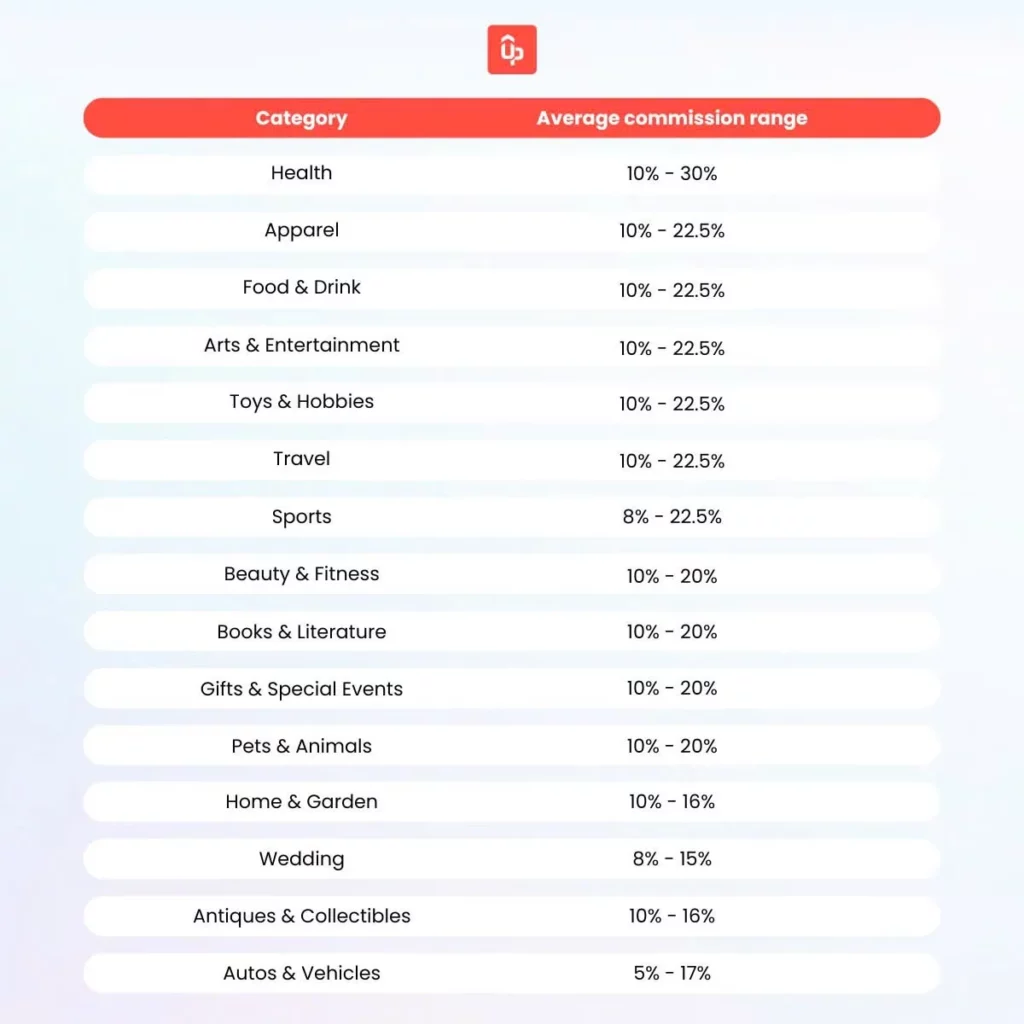Small businesses often struggle with tight marketing budgets. Paid ads can get expensive fast, and SEO takes time to see results. But what if you could grow your sales without upfront costs?
With affiliate marketing, you only pay for actual sales—no wasted ad spend, no guesswork. Instead of pouring money into uncertain campaigns, you reward affiliates only when they bring in real customers. It’s a cost-effective way to scale your business while keeping your budget under control.
In this guide, we’ll walk you through everything you need to know about affiliate marketing for small business. You’ll learn what affiliate marketing is, its benefits, and how to set up an affiliate program from the ground up.
Also, we’ll share practical tips on recruiting and managing affiliate marketers effectively, with real examples you can put into action right away.
Potential Revenue with Affiliates (UpPromote)
Estimate the potential revenue when you recruit affiliates: comparing Current Business and Business + UpPromote.
Estimated Impact
Quickly visualize how affiliates can boost your orders and revenue.
Revenue Comparison: Current vs. with UpPromote
The chart illustrates relative revenue growth comparing two scenarios: organic sales vs. organic + affiliate-driven sales.
- Affiliate traffic quality is equal to your current traffic.
- AOV and Conversion Rate remain stable.
- Does not account for churn, refunds, or potential upsell/cross-sell.
If you’re ready to build your affiliate program yourself right away without upfront costs, start with UpPromote—the top trusted Shopify affiliate solution for growth, recommended by experts and used by over 115,000 brands worldwide.
Easily start your affiliate program without prior experience. UpPromote’s simple interface, along with built-in tooltips, guides you every step of the way.
What is Affiliate Marketing?
Affiliate marketing is a performance-based marketing strategy in which people (called affiliates), such as bloggers, YouTubers, or influencers, promote a brand’s products or services to create sales.
These promoters can use their own websites, social media, or other online channels to share the products or services with their audience. When bringing in sales, they earn a commission or reward in return.
Here’s how it works:

For example, if you sell handmade soaps, an affiliate might be a beauty blogger who loves your products. They write about your soaps on their blog, share their unique affiliate link, and earn a percentage every time their readers buy through that link.
Benefits of Affiliate Marketing for Small Businesses
Starting an affiliate program comes with several key advantages that make it particularly attractive for merchants with limited marketing budgets. Let’s look at why this marketing method makes perfect sense for your brand:
- Low financial risk: Unlike traditional advertising, where you pay upfront, affiliate marketing follows a pay-per-performance model. You only pay commissions after a sale is made, making it a safe investment for your marketing budget.
- High return on investment (ROI): Since you only pay for actual sales, affiliate marketing often delivers an impressive ROI. According to Authority Hacker, businesses earn an average of $15 for every dollar spent on affiliate marketing. In comparison, paid ads just yield about $8 for every $1 spent.
- Expanded market reach: Each affiliate often has a number of loyal followers. Collaborating with your band, they will act like a bridge, connecting you with their fans, including those who might never have discovered your products otherwise. Think about it – instead of trying to reach new customers alone, you have a network of promoters doing it for you.
- Brand trust and credibility: When affiliates share your products, they create more impact than traditional advertising. Their recommendations work like personal advice from a friend, making their followers trust the products and more likely to buy.
How to Set Up an Affiliate Program for Your Small Business
Now that you understand the value of an affiliate marketing program, you might be wondering how to set one up for your store.
Follow our guide to get started:
Differentiate Affiliate Network vs Affiliate Software
The first thing you need to determine is how to launch and manage your affiliate campaign. This decision influences the way you manage it and your overall affiliate marketing costs.
There are 2 popular options for you to choose from:
- Using affiliate management software like UpPromote, Goaffpro, or Refersion.
- Leveraging an affiliate network, such as ShareASale, Clickbank, CJ Affiliate, and Impact.
Of course, affiliate software vs. affiliate tetworks is a common debate, as each solution has its pros and cons.
So, which path should you take?
Actually, it’s hard to tell which is the better solution. Your choice comes down to what your business needs, your budget, and what you can handle.
Here’s what to think about:
- An affiliate network: It might be Ideal if you’re looking for a hands-off option, a quick way to access a large number of affiliates, and are willing to pay extra fees for convenience.
- Affiliate marketing management software: It works wonders if you prefer to run an in-house affiliate program for cheaper costs, more flexibility, and full control.
In case you want to set up your own affiliate campaign in-house but have no idea which affiliate tracking app to choose, look for platforms that offer free trials and have positive reviews. You can test these out before making your final decision. Then, pick a suitable plan when you scale up.
For instance, if you run an ecommerce store on Shopify, you can check out UpPromote, the top trusted affiliate solution for growth with a 4.9/5 rating and over 4,000 reviews on Shopify app store. The app provides powerful features at affordable prices, starting at $0. So, you can jumpstart affiliate marketing without worrying about upfront costs.

UpPromote delivers:
- User-friendly dashboard with helpful built-in tooltips guiding you through every step
- Quick setup process that gets your program running in minutes
- Comprehensive tracking and analytics showing real-time affiliate performance
- 24/7 dedicated support team at your service
Decide on Affiliates Commission Rates
To make your program take off, you need affiliates to join. But remember, they’re also in business to earn. So, your commission structure needs to be attractive enough to catch their attention.
Offering competitive commission rates, compared to competitors’ campaigns that attract similar affiliates, is one of the most effective affiliate marketing strategies. But the key is finding the sweet spot – rates that are appealing enough to stand out in your field, yet realistic for your budget.
You can analyze competitors’ affiliate programs to get ideas for yours and explore average rates within your niche before finalizing your decision.
Here are typical commission rates across popular industries you can take into account:

You can set your affiliate commission structure in different ways:
- Percent of sale: Affiliates earn a percentage cut of each sale they bring (e.g., 10% per sale)
- Flat rate per item: Affiliates receive a fixed payout for each item sold (e.g., $10 per product).
- Flat rate per order: Affiliates get a set amount for every successful referral order (e.g., $10 per order).
- Tiered commission: Higher earnings as affiliates reach new sales milestones (e.g.,10% for sales up to $500, increasing to 20% above that).
💡 Bonus tips:
- Consider your affiliate cookie window carefully. A generous tracking period can give you an edge in attracting partners.
- Match your commission model to your business objectives. To boost sales of specific products, offering a fixed amount per item can be effective. For increasing overall revenue, a percentage-based or tiered commission structure can motivate affiliates to drive more sales.
Create your dream rewards system that affiliate marketers will love with UpPromote.
Select Affiliate Payment Methods
After setting commission rates, it’s time to think about how you will send affiliate payouts to your partners. Paying timely and accurately builds trust and strengthens relationships with them.
To achieve just that, you can do the following things:
- Pick a payout method that works well for both you and your affiliates. Popular options are PayPal, bank transfer, checks, store credit, or gift cards. Keep in mind things like fees, speed, security, and convenience to choose the best fit for your program.
- Decide on a regular payment schedule. Set a clear “payday” that everyone can count on. You can pay every week, every two weeks, or once a month. Select a timeline that suits your cash flow and keeps your affiliates happy.
- Set a minimum payout amount so commissions are only processed once affiliates reach a certain threshold. This way, you can cut down on small transactions and encourage affiliates to sell more to hit the payout mark.
- Consider using automated payments to save time, reduce manual work, and minimize transaction errors.
With UpPromote, paying your affiliates is easy and stress-free. The app automatically calculates commissions and collects payment details, so sending payouts is a breeze.
The best part? You can set up auto payments with PayPal in just a few clicks. Choose a payment date or cycle that works best for you to keep payouts consistent and on time.
Need more flexibility? You can adjust payout thresholds to match your financial goals. Set a minimum amount so affiliates only get paid when they hit that number. You can also add a maximum limit to keep your expenses under control.

Easily schedule automatic payouts via PayPal—no more manual work, and you’ll never miss a payment to your affiliate partners.
Create Clear Affiliate Terms and Conditions
Even if you’re running an affiliate program for a small business, don’t overlook the importance of clear affiliate terms and conditions.
Legal documents might not be an exciting part of your program, but they are essential for protecting your brand in the long run and reducing misunderstandings or disputes with affiliate marketers.
Here are some essential points to cover in your affiliate agreement:
- Program rules: Spell out who can join your program (age, location, website requirements, etc.). Be clear about commission structure and payment details (rates, schedules, minimum payouts). Don’t forget to explain the cookie duration policy and how you track sales.
- Promotional guidelines and restrictions: If you have any brand usage rules (logos, images, content guidelines), include them here. Outline what’s not allowed in your program like spam or misleading advertisements.
- Detail other legal components: Cover important points like content ownership rights, confidentiality requirements, and the process for ending the partnership.
Take a look at Fiore di Perle, an online store that offers handcrafted pearl accessories and jewelry. They have established clear and simple terms for their affiliate program, making it easy to understand from the outset. These documents assist the brand in building healthy partnerships and ensure smooth operations.

💡 Bonus tips: Consider having your terms reviewed by a legal professional to make sure they comply with all relevant laws and regulations.
How to Recruit Affiliates for Your Program
Your affiliate program becomes truly active only when you have affiliate partners. But where and how can you find and attract the right ones to join?
Here’s how to go about it:
Create An Affiliate Signup Page
Your affiliate signup page is like an invitation to tell why affiliate partners should come to your program. To make it appealing, clearly list all the outstanding benefits your program offers to grab potential affiliates’ attention right away.
Sharing these benefits openly also builds credibility. When affiliates understand what’s in it for them, they’re more likely to trust the partnership and feel confident about joining.
So, what key points should you highlight on your landing page? Take into account these ideas:
- Competitive and lucrative commission rates
- Transparent payment methods and frequency
- Attractive extra bonuses and incentives (if any)
- Additional support and creative affiliate assets
You can see how Devoted Pet Foods, an online store selling premium, natural pet foods, showcases its program benefits to potential affiliates on its landing page. The brand presents key aspects such as competitive commissions, a good cookie period, clear payment processes, and more.

Do you want to create a stunning yet functional registration page like Devoted Pet Foods? Explore and leverage affiliate signup form templates on UpPromote to design your own.
Form a well-crafted affiliate landing page to boost affiliate signups with UpPromote —quick, easy, no coding needed.
There are 3 flexible options available to choose from:
- The Basic Template

- The Comfort Template

- The Trendy Template

Leverage Multiple Channels to Find Affiliates
There are different types of affiliates, such as influencers, bloggers, podcasters, review sites, and even your existing customers. So, don’t limit yourself to just one channel when finding partners. You can try various ways to boost the chance of affiliates finding your program and joining
Consider these ideas to expand your reach:
- Share your affiliate signup page on your website and social media to get more eyes on it. Running ads can also help attract potential partners to sign up.
- Turn happy customers into brand advocates by setting up a refer-a-friend program. When people love your products, they’ll naturally want to spread the word.
- Search on Google and social media (Instagram, LinkedIn, TikTok, X, Quora, Pinterest, etc.) using keywords related to your niche. This is a great way to find bloggers and influencers who already discuss products like yours.
- Go to industry events and affiliate marketing conferences like Affiliate Summit West/East or Affiliate Huddle. These events are great for networking and meeting potential affiliates in person.
- Join well-known affiliate networks like ShareASale, Commission Junction, Rakuten Marketing, and UpPromote Marketplace. These platforms connect you with a large pool of active affiliates ready to promote. You can also list your affiliate offer here.
Develop Outreach Strategies to Connect with Affiliates
If you want to recruit affiliates more effectively, make a clear outreach plan. Since not all affiliates are the same, try to personalize your approach to connect with each type in a way that feels natural and meaningful.
Here’s what to think about:
- Reach out to affiliates through email. Start by finding their email addresses on the ‘Contact Us’ or ‘About Us’ pages of their websites or in their social media bios. When sending a message, make it personal—use their name and keep it short and clear. Let them know why you’re reaching out and how working together can benefit them and their audience.
- Connect with affiliates on social media, especially influencers and bloggers. Instead of jumping straight into a pitch, take time to engage with their content first. Follow them, like their posts, and leave thoughtful comments to get on their radar. When you do reach out, make your message personal and explain why you think a collaboration would be a great fit.
- Meet affiliates in person by attending industry events. Look for well-known ones and check the costs so you can budget accordingly. If possible, review the attendee list ahead of time to spot potential partners. Also, think about how you’ll introduce your brand and make a strong impression when talking face-to-face.
How to Manage Affiliate Partners Effectively
Launching your campaign and bringing affiliates on board is just the beginning. To succeed, you need to manage your partners well, support them in improving their performance, and find ways to make the most of your affiliate marketing budget.
Here are some practical tips to do just that:
Provide Training to Affiliates
A good training process helps your affiliates understand your products, brand, and how everything works. When they have the right knowledge, they can promote your business better and stay on brand.
You can think about the following ideas:
- Put together a welcome kit with key product details and what makes them special.
- Share brand guidelines, like logos, colors, and tone of voice, so they stay consistent.
- Give clear instructions on how to use the affiliate dashboard and tracking tools.
- Create easy-to-follow training materials—video tutorials, product webinars, FAQs, and ready-made marketing assets like banners and email templates.
If you’re using UpPromote, you can easily share a detailed guide with affiliates as soon as they sign up. Simply upload videos, notes, or announcements to the Guide page in just a few minutes. Once approved, affiliates can access everything they need right from the Guide tab in their dashboard.

Communicate and Build Strong Affiliate Relationships
Good communication is the heart of any strong relationship, and the same goes for your affiliate partnerships.
To build a good connection with your affiliates, start by being open and clear about your campaign goals and expectations from the beginning. Make sure they understand your program’s rules, products, and brand values. When they know what to do, they can plan better and work towards their goals with confidence.
But communication doesn’t stop there.
To keep a strong and lasting relationship, try these simple things:
- Be available when they have questions or need support.
- Keep them in the loop with updates about your program, new products, marketing tools, or promotions.
- Listen to their ideas and brainstorm together to find better ways to promote.
- Give them personal feedback on what they’re doing well and where they can improve.
- Check-in from time to time through email, messages, or calls—especially if they seem less active.
- Send a simple thank-you message when they hit big sales milestones.
With UpPromote, staying in touch with your affiliates is easy:
- In-app chat: Message affiliates directly without leaving the app.

- Email: Use simple, ready-made templates to send updates to multiple affiliates at once.

Incentivize and Reward Affiliate Partners
Keeping your affiliate partners excited and motivated is a key part of managing your program. When done right, it encourages affiliates to stay with you long-term and actively promote your brand.
Don’t just stick to standard commission rates. Offering extra bonuses is a great way to make your program more appealing.
You can try the following:
- Give performance bonuses when affiliates reach certain sales targets. For example, reward a $100 bonus when they bring in $1,000 in sales within a month.
- Run fun contests with prizes like gift cards, free products, or cash to keep them involved.
- Boost commission rates during peak seasons, like holidays or product launches, to encourage more sales.
If you’re using UpPromote, engaging with affiliates becomes even simpler:
- Use the Bonus feature to reward top performers with custom bonuses—just set the rules, and it’s done in a few clicks.

- Show appreciation to hardworking affiliates by sending surprise gifts through the Gift feature, making them more enthusiastic about spreading word about your products.

Track and Optimize Your Affiliate Campaign
To make sure your affiliate program runs smoothly and brings the best results, you need to track and improve it regularly.
By keeping an eye on your campaign, you’ll know exactly what’s working and what’s not. With this information, you can make smart changes and use your resources wisely.
An affiliate tracking app can make this process much easier by providing real-time data and detailed reports on affiliate performance.
For example, with UpPromote, tracking your affiliate program is simple. The app automatically records each affiliate’s activity using reliable tracking methods. And the best part? It gives you clear, easy-to-read reports showing key numbers like affiliates, orders, sales, clicks, and commissions.
Everything is presented in simple graphs, so you can quickly see how your program is doing. You’ll easily spot your top affiliates and best-selling products and even download reports in Excel, CSV, or PDF formats.
 Prevent Affiliate Fraud
Prevent Affiliate Fraud
As an affiliate manager, here’s something you should know: Affiliate fraud costs businesses billions of dollars every year. In 2022, CHEQ, a top cybersecurity company, found that ad fraud made up 17% of all affiliate traffic, leading to $3.4 billion in losses.
To run a successful affiliate program, spotting and stopping scams is a must.
Fraud in affiliate marketing comes in many forms, like fake clicks, false purchases, affiliate hijacking, and cookie stuffing. Without credit monitoring, these fraudulent activities can go undetected for extended periods, causing significant financial damage to your business. To keep your program safe, here are a few things to remember::
- Set clear rules on what’s allowed and what’s not (e.g., no misleading ads or spam) and outline the consequences. Make sure to include cookie expiration policies to reduce fraud.
- Monitor affiliate data closely. If you notice sudden spikes in clicks or sales, double-check to make sure everything looks right.
- Use fraud detection tools to catch issues like fake clicks or cookie stuffing.
- If you find fraud, act fast. You can withhold commissions, block affiliates, or even remove them from your program. If needed, get legal advice to handle serious cases properly.
With UpPromote, you can easily secure your affiliate program with built-in fraud detection features. Here’s how UpPromote helps protect your business:
-
- Spot and block fake signups or referrals from suspicious IP addresses.
- Reject referrals from flagged IPs.
- Prevent certain affiliates from joining.
- Hide your affiliate signup page from search engines.
- Allow only affiliates from specific countries or regions to register.

Address Legal and Compliance Considerations
Staying compliant in affiliate marketing is another important task. It helps you avoid legal trouble, prevents misunderstandings, and builds trust with your partners.
You should keep in mind those things:
- Follow privacy and advertising laws like GDPR (EU), CCPA (California), and FTC guidelines (U.S.) to stay transparent and avoid fines.
- Set clear rules in your terms and conditions, covering sign-up, affiliate responsibilities, promotion guidelines, commissions, payments, confidentiality, and what happens if someone breaks the rules.
- Be upfront about taxes and make sure affiliates provide the right forms, like W-9s in the U.S. or equivalent forms in the EU.
💡Bonus tips:
- Talk to a legal expert to make sure your affiliate program follows the rules and keeps you protected.
- Use an accounting or affiliate management tool to handle taxes and invoices. It’ll save you time and reduce stress.
With UpPromote, managing taxes and invoices is simple:
You can decide whether you or your affiliates will handle tax responsibilities depending on your needs. Just enter the tax rates based on local regulations, and the system will calculate payouts automatically—no manual work is needed.

For hassle-free invoicing, turn on the Export Invoice feature. Whether you need a standard format or an EU-specific one, UpPromote has you covered. Both you and your affiliates can quickly download invoices for paid referrals. Each invoice includes all the important details: Invoice ID, Payment method, Payment info, Payment amount, Affiliate name, and Referral details.

Examples of Small Businesses Running Successful Affiliate Programs
Now you know how to start an affiliate program and have picked up some useful tactics to find and manage affiliates effectively. But if you’re still looking for a little extra motivation before diving in, check out these real-world success stories for inspiration:
TréSkin

TréSkin, a well-loved organic beauty and health brand in the USA, is a great example to get you inspired.
In just three months of using UpPromote, they brought in over $120,000 in affiliate revenue.
How did they do it? Here’s what they focus on:
- Make affiliate program terms clear and easy to access. Display the terms on their website so potential affiliates can review everything before signing up.
- Keep the registration form simple and straightforward. It highlights key details like commission rates and cookie duration while only asking for essential information (such as name and email), making the sign-up process quick and easy.
- Introduce a 4-tiered commission rate, ranging from 15% to 35%. This strategy attracts new affiliates and motivates existing ones to perform better.
- Promote the program across multiple channels. They share their offer on social media platforms like Facebook, LinkedIn, and Instagram while listing it on UpPromote Marketplace to reach more potential partners.
- Work with top influencers and bloggers in the beauty niche to get more exposure and build trust with their audience.
Zomee

Zomee is a brand dedicated to supporting breastfeeding moms with comfortable, easy-to-use breast pumps and accessories. They focus on quality and convenience, hoping to reach more moms around the world. To make that happen, they team up with affiliates who can share their stories and spread the word about Zomee’s products.
By running an affiliate program with UpPromote, Zomee has achieved impressive growth in website traffic, online sales, and ROI.
- Website traffic grows by 15%
- Affiliates bring in 20% of total online sales
- Revenue from affiliates triples
So, what strategies helped them achieve this? The answers are:
- Team up with the right affiliates—mommy bloggers, health and wellness influencers, lactation consultants, and social media creators—to reach the right audience.
- Offer fair commissions of 10-25% per sale, depending on the affiliate’s reach and performance.
- Recognize top performers by tracking their sales with UpPromote’s analytics and rewarding them.
- Stay in touch with affiliates through direct messages or bulk emails to keep them updated and engaged.
- Make sure payments are on time with automated PayPal payouts, so affiliates feel happy and secure.
Holbrook Pickleball

Holbrook Pickleball started as a small, family-run business selling high-quality pickleball paddles and gear. When realizing the potential of affiliate marketing to thrive, they decided to create their program through UpPromote.
With a well-structured affiliate program, they saw some amazing growth:
- 173 new affiliates joined the campaign.
- Orders from ambassadors went up by 87% by the end of 2023.
- Affiliate revenue grew by 86% in just one year.
So, what made their affiliate program so successful? Here are some key lessons you can learn:
- Make signing up easy. A simple, clear registration page helps affiliates join without hassle.
- Clearly outline your program rules. Listing the terms on your website makes it easy for potential affiliates to review them before joining.
- Offer a good commission. Holbrook gives ambassadors 15% store credit for every sale made through their code.
- Run fun sales contests. Monthly competitions with prizes like free products or bonuses keep affiliates excited and motivated.
- Stay connected with affiliates. Regular training webinars help answer questions, share updates, and build a stronger community.
- Go where your affiliates are. Holbrook attends national pickleball events to meet influencers in person and grow its team.
- Track performance and reward top affiliates. Using UpPromote’s analytics dashboard, Holbrook monitors real-time sales and quickly rewards top-performing affiliates with special gifts.
Conclusion
Affiliate marketing is a smart strategy for small business owners to grow without overspending. It helps spread the word about your brand, increases sales, and builds strong relationships with people who truly believe in what you do.
If you’re ready to launch your own small business affiliate program and take your growth to the next level, use our guide to get started. Be sure to choose the right affiliate marketing software or network that fits your needs and supports you along the way.


 Prevent Affiliate Fraud
Prevent Affiliate Fraud




